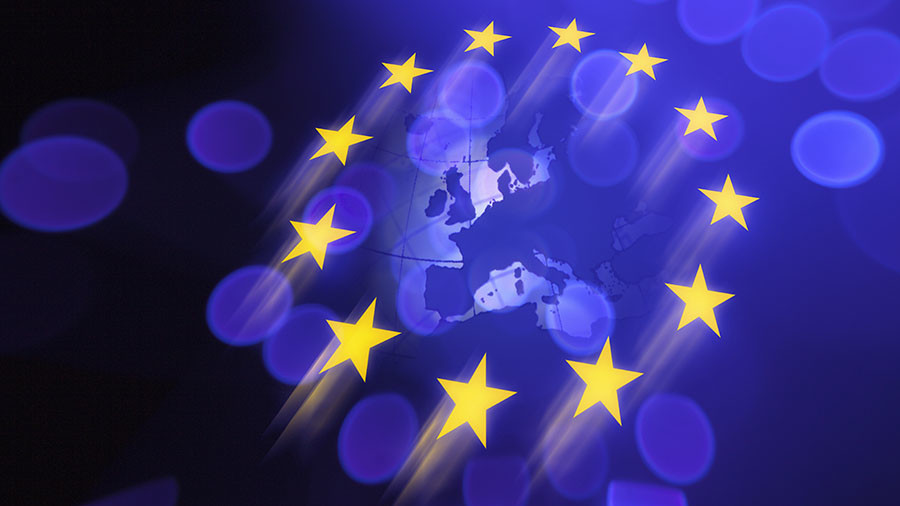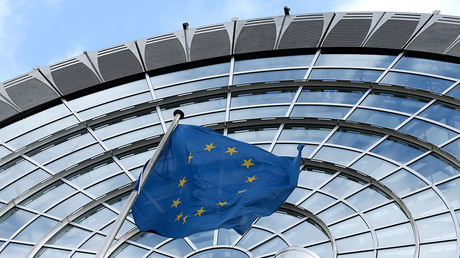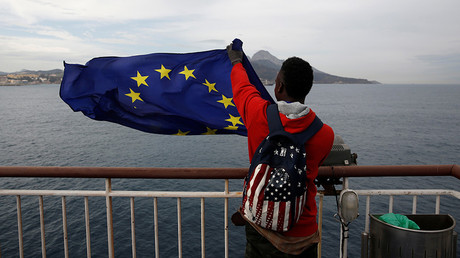Schulz’s ‘United States of Europe’ is an insane pipe dream that will never happen
Danielle Ryan is an Irish freelance journalist. Having lived and worked in the US, Germany and Russia, she is currently based in Budapest, Hungary. Her work has been featured by Salon, The Nation, Rethinking Russia, Russia Direct, teleSUR, The BRICS Post and others. Follow her on Twitter @DanielleRyanJ, check out her Facebook page, or visit her website: danielle-ryan.com

To many of its citizens, the European Union has already lost its appeal. The 28-member bloc is plagued by disunity and indecision. Since its inception, the EU has stumbled from one impasse to another, suffering from a severe case of bureaucratic bloat.
Now, imagine taking the current mess and trying to make a single, united country out of it. I haven’t taken a poll, but I imagine this kind of scheme would rightly strike most people as hair-brained and ridiculous; a totally unfeasible and unrealistic goal.
But not the leader of Germany’s Social Democratic party. Martin Schulz envisions the creation of a “United States of Europe” by 2025. In a speech to the SPD’s party conference in Berlin, Schulz announced that he would like EU member states to sign a “constitutional treaty” as a step toward federalizing Europe.
“Such a constitutional treaty has to be written by a convention that includes civil society and the people. This constitutional treaty will then have to be put to the member states and those that don’t approve it will automatically have to leave the EU,” Schulz said.
That’s right. If any EU member state fails to approve such a treaty, they’re kicked out. On your bike, pal.
There are already plenty of political movements scattered across the continent which are opposed to EU membership as it is. So, one can easily imagine that it would be a very small EU that remained at the end if Schulz’s pipe dream ever came to fruition. Not to mention, if the idea itself wasn’t already totally unviable and idealistic, the timeframe suggested by Schulz is even more ridiculous. But let’s just imagine for a second what a USE would look like.
Disappearing sovereignty, uncontrollable government
First and foremost, the sovereignty of EU member states would be transferred to Brussels. Europe, now a country, would boast a population larger than the British Empire at its peak. Unelected bureaucrats would rule the roost over more than 500 million people. Local government would become increasingly less relevant, while the top dogs in Brussels consolidated their power, making decisions about everything from economic policy to war and peace — without any true say from the people. The idea that a United States of Europe could exist and still call itself a democracy is laughable.
There are of course those who will point to the United States of America and suggest that it is possible to create something similar in Europe. But Europe is not the US. It is not even remotely similar.
Culture clashes
Schulz might not have noticed, but each European nation has its own distinct culture. In fact, different cultures exist across regions, even within countries. Many people within those cultures are immensely proud of their histories and traditions and their often hard-won sovereignty. Attempting to seamlessly smash them all together into one big America-style melting pot where everyone supposedly magically agrees on a set of principles conjured up in Brussels would never work.
One has the impression that Schulz needs to head round to his local library and pick up a few history books. He might find some interesting reading on previously ill-fated attempts at unions of people and nations across Europe. Like for example, the Soviet Union or the Roman Empire. Or perhaps he could just turn on the news and check out the latest on Catalonia, Scotland, Northern Ireland, etc.
To quote the first president of the European Council, Herman Van Rompuy, in 2012: “The European Union will never become the United States of Europe. There are 27 or 28 [member states] with Croatia. Each country has its own history, some have a history of 200 years, like Belgium and some have a history of a thousand years. So we are not like an American State. We have our own languages; we have 23 languages in Europe. We have a special identity in each of our member states and a very specific situation due to our history…”
The language problem
Since Croatia joined the bloc in 2013, the EU translates almost everything it produces into 24 languages. That is no easy task and requires a small army of translators.
Some officials will only speak their national language out of principle. Many others regard the translation efforts required a massive waste of time and resources and suggest adopting English as the official language of the EU. English, after all, is the lingua franca — the most commonly shared and spoken language between EU officials and bureaucrats. But efficiency takes a back seat to national pride. In a sense, it is understandable. Adopting one language when not all those in the 28 nations speak it might be cheaper and more productive — but it’s not exactly democratic.
Ultimately, language issues can be and are dealt with, however expensively, in the EU in its current state. But what would happen if the EU was suddenly one country? Would we still do everything in 24 languages? Would we adopt English as our new combined national language — even after the only country using it as their ‘official’ language has jumped ship? That would be especially strange given that there is talk of English losing its status as an official EU language at all once the UK leaves the group.
Bottom line
Perhaps Schulz and some of his eurocrat supporters just desperately want to believe in Francis Fukuyama’s ‘end of history’ — where the great intellectual struggles and debates of history have ended, and we can all live in ideological harmony; where Viktor Orbán and Angela Merkel can sing Kumbaya around the campfire, and Catalans suddenly decide they no longer want more independence, but less of it.
In reality, Schulz’s idea, ironically, would probably do more to jeopardize the integration that has already been achieved within the EU rather than further solidifying it. A poll published by the German newspaper Bild found that only 30 percent of Germans favor Schulz’s idea, while 48 percent reject it. It is highly unlikely that the tide would ever turn so much that the majority of citizens in each EU state would favor federalizing the union.
To quote French philosopher André Glucksmann, the European Union began as “a defensive reaction to horror” after two world wars. The problem is, as Glucksmann pointed out, the players “may not be keen on war, but they don’t mean well by one another either.”
Each nation is rightly self-interested. That is never going to change — and inevitably nothing could break up the EU quicker than a serious attempt at turning it into the United States of Europe.
The statements, views and opinions expressed in this column are solely those of the author and do not necessarily represent those of RT.




0 Comments:
Post a Comment
Subscribe to Post Comments [Atom]
<< Home